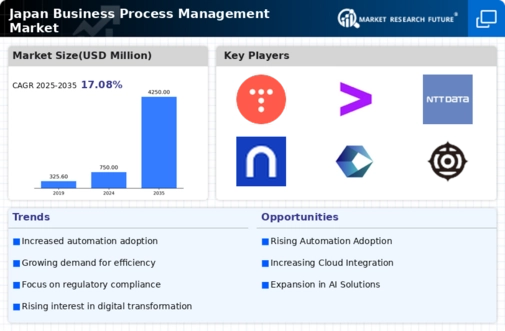Emphasis on Customer Experience
In the Japan business process management market, there is a growing emphasis on enhancing customer experience. Organizations are increasingly aware that streamlined processes directly impact customer satisfaction and loyalty. Data indicates that companies that prioritize customer-centric processes can achieve a 20% increase in customer retention rates. This trend is particularly relevant in the retail and service sectors, where customer interactions are frequent and critical. As businesses strive to meet evolving customer expectations, the focus on improving customer experience through effective business process management is likely to drive market growth.
Integration of Advanced Technologies
The integration of advanced technologies, such as artificial intelligence and machine learning, is significantly influencing the Japan business process management market. These technologies enable organizations to automate complex processes, analyze vast amounts of data, and make informed decisions. For instance, companies utilizing AI-driven analytics have observed a 25% improvement in decision-making speed. This technological advancement not only enhances efficiency but also fosters innovation within organizations. As businesses in Japan continue to adopt these technologies, the demand for sophisticated business process management solutions is expected to rise, further shaping the market landscape.
Growing Demand for Operational Efficiency
The Japan business process management market is experiencing a notable surge in demand for operational efficiency. Organizations are increasingly recognizing the necessity to streamline their processes to enhance productivity and reduce costs. According to recent data, companies that have implemented business process management solutions have reported up to a 30% increase in operational efficiency. This trend is particularly pronounced in sectors such as manufacturing and finance, where process optimization is critical. As businesses strive to remain competitive in a rapidly evolving market, the focus on operational efficiency is likely to drive further investments in business process management solutions.
Regulatory Compliance and Risk Management
The Japan business process management market is significantly influenced by the need for regulatory compliance and effective risk management. With stringent regulations across various sectors, organizations are compelled to adopt business process management solutions that ensure compliance and mitigate risks. Recent statistics reveal that companies investing in compliance-focused process management have reduced regulatory breaches by 40%. This trend underscores the importance of integrating compliance measures into business processes, thereby driving demand for specialized solutions within the market.
Shift Towards Remote Work and Digital Transformation
The shift towards remote work and digital transformation is reshaping the Japan business process management market. As organizations adapt to new work environments, there is an increasing need for digital solutions that facilitate collaboration and process management. Data suggests that companies embracing digital transformation have experienced a 15% increase in employee productivity. This shift not only enhances operational flexibility but also necessitates the adoption of robust business process management tools to support remote workflows. Consequently, the demand for innovative solutions in the market is expected to grow as businesses navigate this evolving landscape.
















